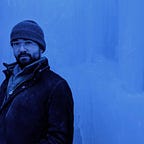On Vacation
In late July, I participated in Thomas Coyne’s week-long immersive survival program in Alaska. The goal is to survive in the woods — specifically the boreal forest, or Taiga — with minimal gear: a knife, some rope, and a full set of clothing. I joined this program knowing no one else, and perhaps unsurprisingly, so did the other dozen or so awesome humans on our trip.
In short, we built shelters, bow drills, and fires. To catch animals, we made spears, fishing ‘rods’, and deadfall traps — though our failure to actually catch anything forced us to satisfy our hunger by fantasizing about food, sometimes quite sensually. We identified and foraged for edible plants — thank God for those. We simulated emergencies to practice map/compass technique and caring for injured people in the wild. There are a lot more details of course, but those can be found on the course’s website, and on Bear Grylls’s youtube channel.
I’d like to clarify all the things this program was not: This wasn’t a spiritual retreat. There were no calls for meditation. No sun salutations or kundalini openings. Our program didn’t ask us to self-actualize or to detoxify — though my unintentional week-long fast has earned envy from “yogis” and dieters alike. We weren’t offered drugs or plant medicine — unless you count the antiseptic Birch branches with which we brushed our teeth. Our guides required nothing deeper from us than the penetration of our hatchet swings.
I’ve participated in much of the depth searching mentioned above, through coaching seminars, retreats, and backpacking. Some of these experiences stand as some of the most important experiences in my life. Yet my week in Alaska stands on its own.
In Meditations, Roman Emperor and Stoic, Marcus Aurelius wrote “philosophy requires only what your nature already demands.” By surviving under a stick and leaf shelter in the taiga, we submitted ourselves to nature, and philosophy followed, naturally.
Since I could remember, I have always considered my career — and everything which immediately surrounds it — to be “Real Life”. Spending time with friends, going on a retreat, driving to Mongolia, rock climbing at a gym; these were all respites, breaks from “Real Life” where I could recharge and feel good about myself.
I was deeply mistaken.
What could be more real than feeding a fire all night to keep my stick and leaf shelter warm enough to avoid hypothermia from seeping into my bones? Can I find in my life an anxiety more pertinent than getting swept up crossing a glacial river? In my finance career, can I find a feeling of hopelessness more palpable than the failure to catch food while slowly giving way to starvation? Or how about a joy more substantial than finding a clearing full of juicy cranberries while foraging in the depths of hunger, and stuffing them down my face?
Humans evolved in nature. Our bodies and minds are not meaningfully different from our ancestors who first harnessed fire. So when we return to similar conditions of raw nature, everything is as it should be, and feelings make sense; abstract emotions become real. By comparison, feelings common in modern civilization like social anxiety and loneliness make no sense. And feelings without sense are a perfect recipe for existential dread in New York City — it makes for good nightlife though.
Urslula LeGuin, in characterizing her protagonist’s growth in The Dispossessed, emphasized that “true voyage is return”. Only when I touched down back on the East Coast, did I begin to recognise my new perspective. I didn’t return to “real life” from some less real vacation in Alaska. On the contrary, I had just returned back to my life of vacation after the most real week of my life. So that’s the lesson: life in civilization, including one’s career (but not including what is necessary for basic survival), is all a vacation. We might do well to approach it as such. I look forward to returning to real life.
